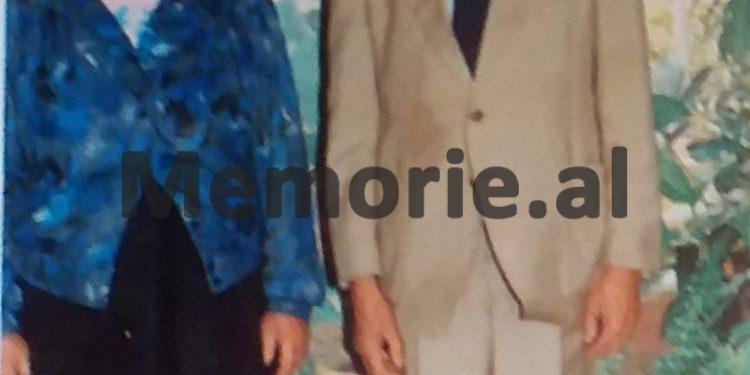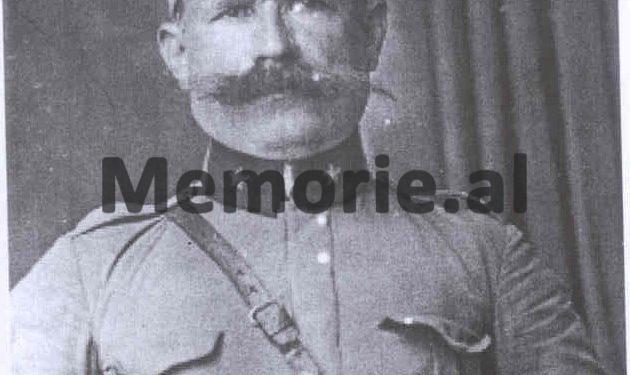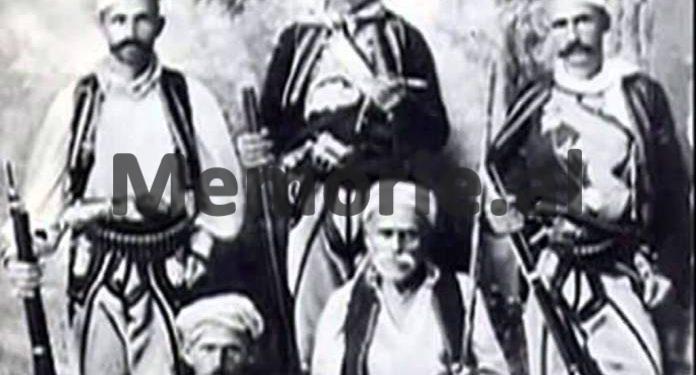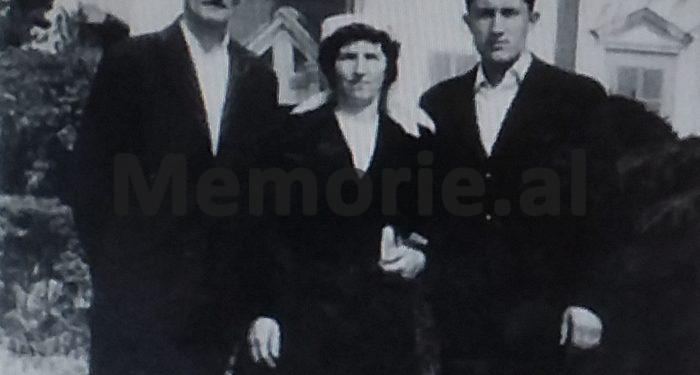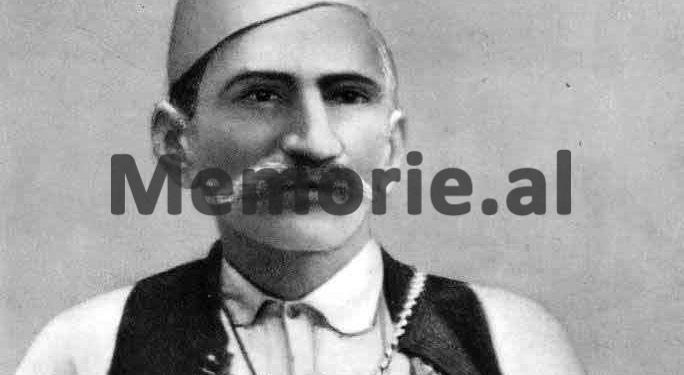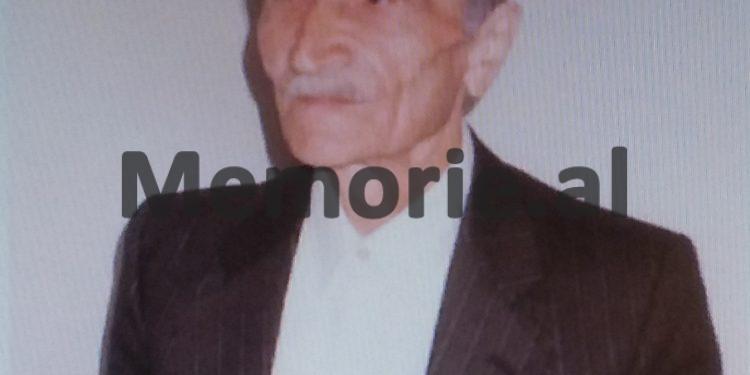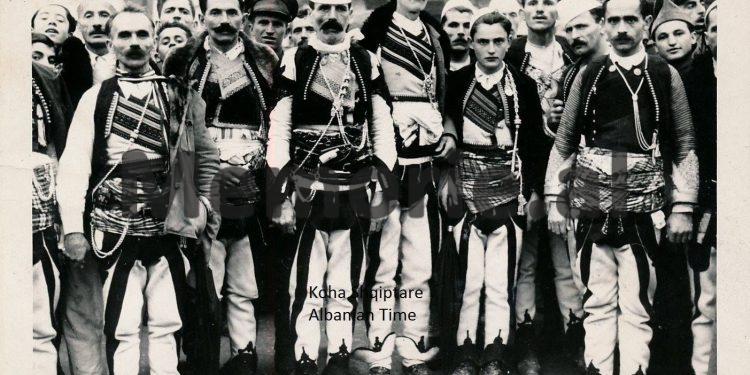Dashnor Kaloçi
Memorie.al publishes the unknown story of Mark Sadiku, who in the period of the Zog Monarchy was elected by an assembly of highland men as “Chairman of the Shala Youth” in April 1939, after refusing to go to Rome with the delegation that brought the Crown of Skanderbeg to the King, Victor Emmanuel III, was arrested and exiled to the islands of Italy, where he suffered until 1943 when Mussolini’s fascist Italy capitulated. Mark Sadiku’s call and consecration in the assembly of the men of Malësia organized by the deputy prefect of Plava and Gucia in 1944, to all the men who had gathered there, asking them to forgive the bloodshed and enmity and to unite to fight against the Serbo-Montenegrin forces that carried out massacres against the Albanian population of that province. The arrest of Mark Sadiku and his two sons, Sadiku and Geto, they surrendered themselves after the amnesty granted by the communist regime and the murder of Mark by the enemy, while he was going to a meeting organized by the communists and the escape of his two sons he and his daughter in the mountains and then in Yugoslavia, where after suffering several years in prison as nephews of Mehmet Shpend, they obtained political asylum and settled in France with their families.
“After the murder of our father, Mark Sadiku, in early 1946, our sister, Prena, two brothers, Sadiku with Gjeto, their nephew, Kol Ndou, together with his cousin, Pjetër Mehmeti, (son of Mehmet Shpendi) went on the run after being asked to be arrested by State Security. While they were in the mountains, Peter was killed in an attempt by partisan pursuit forces after being cut off by a man from Upper Curraj. After that, Sadiku and Gjeto and Kola surrendered after being pardoned by the communists and all three were imprisoned. After that day, all the women of the family, starting from Mark’s wife, Mirja, (our mother) daughter, Prena and the brides, Drage e Age, were interned in the camps of Berat, Tepelena and Elbasan “. This is how Syke Sadiku (Vojvoda), the daughter of Mark Sadiku, the Mayor of Djelmnia e Shala, (who comes from the family of the hero, Mehmet Shepend, killed in the war against the Serbo-Montenegrins), remembered the painful story of her, where some of them were forced to flee Albania since 1948 and others who remained here, were persecuted in the most barbaric way by the communist regime of Enver Hoxha. Who was Mark Sadiku, what was the origin and past of that family and how were they massacred by the communists?
Who was Mark Sadiku?
Mark Sadiku was born in 1889 in the village of Pecaj in Shoshi, where the family originated, and his father, Sadik Mark Shendi, was the brother of Mehmet Shpend, the famous hero and leader of the Northern Highlanders, who was killed fighting at gunpoint against Serbo-Montenegrin forces. Since he was alive, Mehmet Shpendi, his house in Pecaj of Shala, formed for the first time the “Son of Shala”, which aimed to preserve the customs of the mountains, to divide the elders in the assemblies of men and to lead the mountaineers in wars against all enemies. The formation of the “Son of Shala”, was asked, Shpend Sadri (Mehmet Shpend’s father), from 90 highlanders of that province, when he was 84 years old. After consulting with his son, Mehmet Shpend, Shpend Sadria came out the next day to the assembly of men where in the presence of Dom Pjetër Deda, a pledge was made between all those men who had gathered in that assembly. From the day that “Djelmnia e Shala” was created, it was headed by Mehmet Shpendi’s house and after his assassination, its leadership was inherited by his nephew, Mark Sadiku of Shala. Mark was a profound connoisseur of the canon of the mountains and he was often summoned and sent to the assemblies of the men, tribes and elders of the Bajraks, for reconciliation of bloodshed, division of borders and quarrels, etc. So, from the time that Mark Sadiku was put in charge of the “Son of Shala”, and throughout the period of the Monarchy, he was one of the most respected men of that region. Marku married Mire Mushaka from the Gjonpepaj tribe of Nikajs, who was a manly woman who flowed from the door of Hajdar Mehmeti, known throughout that province for her generous and wise home. From that marriage, they had four children: Sadiku, Gjeta, Syka and Prena.
Mark’s exile in Italy
Like many other nationalists, Mark Sadiku openly opposed the fascist occupation of Albania, which led to his arrest and deportation to the islands of Italy. Regarding this, his daughter, Syka Sadiku (Vojvoda) told us: “In April 1939, a few days after the occupation of Albania by fascist Italy, our father Mark Sadiku, who was known and respected as the “Chairman of the Shala Youth “, Announced that he would go to Tirana, where the high government authorities would hold a meeting with the nobility and bayraktars of the North. As it was said then, the purpose of organizing that meeting by the state authorities of Tirana, would be to elect some men from the nobility of the North, to go to Rome, where the Crown of Skanderbeg would be taken, King Victor Emmanuel.
But for the real purpose of that meeting, both the father and the other men who had been called to that meeting had not been told anything, and the truth about it we learned a few days later. After receiving that announcement, Marku dressed in a national costume and went down to Shkodra, where the meeting place was left with the other men of the parish and the Bajraks of Malësia who would go to Tirana. But as soon as the father went near the Prefecture, he was arrested by the Italians and after a few days, together with many other nationalists who had opposed the fascist occupation of the country, they were sent to the Tirana prison and from there they were interned on the island of Ventotene in Italy. There in that prison where many other Albanians were interned, my father stayed until 1943, when Italy fell. The clothes of the national costume that my father wore that day when he was about to fall in Tirana, he did not take off all the time that he was interned in the islands of Italy. When his friends said to him: ‘Why didn’t Mark take off these clothes and wear other ones like ours?!, My father answered them by saying:’ These are wedding clothes and I have been wearing them since the day I The King of Italy had spoken and I could not remove them without his permission. “Baba could be released from exile only when Italy fell, in the early autumn of 1943 and at that time he came to Albania together with his friends who had been interned”, recalled Syke Sadiku (Vojvoda), related to him her father, Mark Sadiku of Shala, who was arrested by the Italians and suffered for more than four years in Italian prisons for openly opposing the invasion of Albania in April 1939.
Mark in Plava
After being released from exile and coming to Albania, Mark Sadiku of Shala went to his birthplace in the village of Pecaj in Dukagjini, where he was warmly received, not only by his family and relatives, but also by all the men of that province and the nobility of Shales. Regarding this, his daughter Sykja told us: “When my father came home, the deputy prefect of Plava and Gucia, Shem Seferi, shot at all the men and tribes of Malsi e Madhe, Dukagjini and Malsi e Gjakova, to gather in a large assembly and to take up arms in defense of Albanian lands. More than forty-two Bajraktars, with more than 10 thousand armed men, fell in Plava and Guci when the deputy prefect was fired. In that assembly that was held in Plava, the most prominent representatives of the first Bajraks of the North spoke, such as: Dedë Shabani for Malësia e Madhe, Shem Seferi for Plava and Gucina, Dem Ali Pozhari for Malësia e Gjakovës and the districts of Peja, and Mark Sadiku for Dukagjini.
During that assembly, Mark, made the proposal that was rightly called, saying that from that day on the oath of allegiance had to be given by all those persons and tribes who had old troubles, grievances or bloodshed without receiving, in order to ‘interrupted them. Because from that day, Malësia and all of Albania were threatened by a great and common enemy, which were the Serbo-Montenegrins, who under the guise of communism sought to secure again the Albanian lands unjustly violated during the First World War. The father said there in that assembly, that; ethnic boundaries did not belong to one tribe or one flag, but they belonged to all peoples regardless of religion, idea or province. After that, Mark Sadiku asked all the men who had gathered in that assembly to pledge allegiance there in the men’s square, so that in case of need when danger arose, all of them would respond to the challenge given by issuing volunteers. armed to go to that part of the border which was endangered by the enemy. After these words uttered by the father, men from all over Bajra were bound there, and from that day on, armed guards were stationed at the most delicate points of the border, and they were instructed to always investigate the movements of the Serbo-Montenegrin communist brigades., to immediately notify the presidents of that covenant.
And what was foreseen by the father and by all those men who attended that assembly, did not take long to become a reality. Thus, shortly afterwards, in November 1944, the Serbo-Montenegrin communist brigades stormed our land, crossing the ethnic border. After that, Guciet and Mark Sadiku were summoned, not only as Chairman of Djelmnia e Shala, but also as chairman of the nationalist forces of Dukagjini, gathered all the gunmen of that province and immediately crossed Qafë e Pejës and joined the forces of Prek Cali of Kelmendi, and those of Xhem Sadri who came from Malsia of Gjakova. At that time the winter was very strong and the mountains of Cecun and Nakut, which were covered with snow, released large avalanches which they took under themselves and left many mountain warriors to be buried. The fighting that took place in Qafë i Previsës and in Vasoviiq, ended with the victory of the Albanian fighters. “After that, Mark Sadiku and all the fighters he had with him, returned to their country”, Syke Sadiku (Vojvovda) recalled about the wars waged by her father, Mark Sadiku, in November 1944 against the Serbo-Montenegrin forces.
Mark’s murder
The end of the war and the coming to power of the communists in December 1944, found Mark Sadiku and his two sons, Sadiku and Gjeton, fleeing through the mountains along with many other men of Shala and Shoshi. Regarding this and the murder of Mark Sadiku, his daughter, Sykja said: “Immediately after the end of the War and the communist partisan brigades entered Shkodra, Mark together with his two sons, (my brothers) Sadiku and Gjeton, went out mountains in order to protect themselves from the communists, who were killing and imprisoning many innocent people. My father knew that the communists would not forgive him and my brother Sadik, who had fought with the nationalist forces of the National Front against the Serbo-Montenegrin communist brigades. This was the main reason they stayed in the mountains until the communist government of Tirana declared the first apology to all political fugitives who had not committed crimes. Taking a bad turn in the life of the mountain and having no other way to cross because the border with Yugoslavia was narrow and the southern one with Greece was under the control of the Greek communists of General Markos, father with my two brothers, Sadiku and Gjeton, decided to dorzue. However, after their surrender to Koder i Shëngjergji, the communists did not leave their word and cut them in half, imprisoning them in Shkodra prison where they had tortured them severely.
This thing famously did not last long, because the communist government of Tirana issued another pardon and released my father and two brothers from prison, as according to them they had not stained their hands with blood. But even after his release, my father and Sadiku and Gjeton were constantly under the surveillance of the State Security forces and all those who knew my father said that Mark Sadiku was going to go back to prison, as he did not speak out. communism. Around 1945, in the mountains of Shala and Shoshi, there were frequent meetings where all the people were called by force and communist propaganda was done. One of these meetings took place on the River Bank in Shala, and on that day my father had gone as a friend to Bale Mark Milani. Although Bala begged Mark not to go to that meeting because he felt something in his heart, from sedra, father, he could not go without it. That day as the meeting was about to begin, Father’s enemy fired three shots into the air and left him dead. “While Marku had not yet given up the ghost, Bale Mark Milani, who remained betrayed, shot him in the rifle and left his father’s killer dead on the spot”, Syke Sadiku recalled, regarding the tragic story of her father, Mark Sadiku, the mayor of Djelmnia e Shala, who after being imprisoned and pardoned by the communist regime in power, was assassinated by his enemy in 1945.
Family escape to France
But how did the fate of Mark Sadiku’s family unfold after his assassination in 1945 and how were they treated by the communist regime of Enver Hoxha? Regarding this, his daughter, Sykja, told us: “After the murder of my father, at the beginning of 1946, my sister, Prena, two brothers, Sadiku with Gjeto, their nephew, Kol Ndou together with his cousin, Pjetër Mehmetin (Mehmet Shpendi’s son) escaped after being asked to be arrested by the State Security. During the time they were all in the mountains, Peter was killed in an attempt by the partisan forces of the Pursuit, after being captured in besa by a man from Upper Curraj. After that, Sadiku and Gjeto and Kola surrendered after being pardoned by the communists and all three were imprisoned. After that day all the women of the family, starting from Mark’s wife, Mirija, (our mother) daughter, Prena and the brides, Drage e Age, were interned in the camps of Berat, Tepelena and Elbasan. But taking advantage of another pardon from the communists, Gjeto, with Sadiku and Kola, were released from prison and after a while they fled again through the mountains, after being wanted by the Security. This happened when my husband, Lekë Vojvoda, was arrested, along with Shosh’s bayraktar.
Together with Sadiku, Gjeta and Kola, they were in the mountains and our sister, Prena, together with Gjeto’s bride, Agen. In 1948, when Albania broke with Yugoslavia, they were able to cross the border and left for Montenegro. At this time only our mother, Mirja, with Sadik’s bride, Dragen, who had two little daughters and was pregnant again, was at home. When they were fighting in Yugoslavia, and the Serbs realized that they were the nephews of Mehmet Shpend, whom he had killed with a knife, they locked them in prisons and concentration camps, moving them from time to time to Guci, Peja, Kotor, Zeta, Hercegnov. , Vucitern and up to Beligrad. Around 1956, when they lost hope for a change in the situation in Albania, they asked the International Organization for Migration to come to Prendim.
“After that, they were given the right and everyone went to France where they lived free for years”, Syke Sadiku, the daughter of Mark Sadiku of Shala, ended her story, regarding the painful history of her family, where one part lived in France and the other part that remained in Albania, was persecuted in the most barbaric way by the communist regime of Enver Hoxha.
Sykes’s two brothers, Gjeta and Marc, who lived in France, died there in a foreign land, leaving a will to their sister, Prena, to bring their remains to rest in their homeland one day. Prena Sadiku kept that trust as the most precious thing and made it a reality only on July 25, 1999. That hot summer day, when more than 1500 men from the 11 Bajraks of the North had gathered in the village of Pecaj, a helicopter civilian sat in a meadow with two small coffins, where the remains of Sadiku and Gjeto were found, the two sons of the famous Mark Sadiku of Shala, to whom, in memory of their father, all over Malsia, a magnificent burial was reserved that day. /Memorie.al




